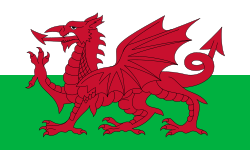| Wales national football team results |
|---|
 |
This article lists the results for the Wales during the First and Second World War. During this period no caps were awarded. [1]
| Wales national football team results |
|---|
 |
This article lists the results for the Wales during the First and Second World War. During this period no caps were awarded. [1]
| 11 October 1919 Victory International [2] | Wales | 2–1 | Cardiff, Wales | |
| Meredith Wynn | Report | Puddefoot | Stadium: Ninian Park Attendance: 20,000 |
| 18 October 1919 Victory International [2] | England | 2–0 | Stoke-on-Trent, England | |
| Whittingham Smith | Report | Stadium: Victoria Ground Attendance: 16,000 |
| 11 November 1939 Friendly | Wales | 1–1 | Ninian Park, Cardiff | |
| 15:00 | Pat Glover | Report | Attendance: 28,000 Referee: S Nicholas (Wales) |
| 18 November 1939Friendly | Wales | 2–3 | Racecourse Ground, Wrexham | |
| Dai Astley | Report | Attendance: 17,000 Referee: S McCarthy (Wales) |
| 13 April 1940Friendly | England | 0–1 | Wembley Stadium, London | |
| Report | Attendance: 40,000 Referee: A J Jewell (England) |
| 26 April 1941Friendly | England | 4–1 | City Ground, Nottingham | |
| 15:00 | Report | Attendance: 13,016 Referee: G Tedds (England) |
| 7 June 1941Friendly | Wales | 2–3 | Ninian Park, Cardiff | |
| 15:00 | Vivian Woodward Billy James | Report | Attendance: 20,000 Referee: A Jones (Wales) |
| 25 October 1941Friendly | England | 2–1 | St Andrew's, Birmingham | |
| Report | Attendance: 25,000 Referee: G S Blackhall (England) |
| 9 May 1942Friendly | Wales | 1–0 | Ninian Park, Cardiff | |
| 15:00 | Billy Lucas | Report | Attendance: 33,000 Referee: W J Gow (England) |
| 24 October 1942Friendly | England | 1–2 | Molineux, Wolverhampton | |
| Report | Attendance: 25,000 Referee: Capt. F C Green (England) |
| 27 February 1943Friendly | England | 5–3 | Wembley Stadium, London | |
| 15:00 | Report | Attendance: 75,000 Referee: G Reader (England) |
| 8 May 1943Friendly | Wales | 1–1 | Ninian Park, Cardiff | |
| 15:00 | George Lowrie | Report | Attendance: 25,000 Referee: T J Warren (Wales) |
| 25 September 1943Friendly | England | 8–3 | Wembley Stadium, London | |
| Report | Attendance: 80,000 Referee: C E Argent (England) |
| 6 May 1944Friendly | Wales | 0–2 | Ninian Park, Cardiff | |
| 15:00 | Report | Attendance: 50,000 Referee: E Davies (Wales) |
| 16 September 1944Friendly | England | 2–2 | Anfield, Liverpool | |
| Report | Attendance: 28,000 Referee: S Nicholas (Wales) |
| 5 May 1945Friendly | Wales | 2–3 | Ninian Park, Cardiff | |
| 15:00 | Horace Cumner George Edwards | Report | Attendance: 25,000 [a] Referee: W T Nash (Wales) |
| 20 October 1945 BHC Victory International | England | 0–1 | The Hawthorns, West Bromwich | |
| Report |
| 10 November 1945 BHC Victory International | Scotland | 2–0 | Hampden Park, Glasgow | |
| William Waddell Jock Dodds | Report |
| 4 May 1946 BHC Victory International | Wales | 0–1 | Ninian Park, Cardiff | |
| Report |
| 21 September 1891 [a] [5] | Wales | 1–1 [b] | Wrexham, Wales | |
| 16:45 | J. Davies | [6] : 8 | Buckingham | Stadium: Racecourse Ground Attendance: 500 Referee: James Davies |
| 12 October 1891 | Wales | 2–1 | Wrexham, Wales | |
| [7] | R. L. Jones W. Lewis | [6] : 9 | Bowman | Stadium: Racecourse Ground Attendance: 4,000 Referee: |
| 11 May 1935 [c] | The Football League XI | 10–2 | | Liverpool, England |
| Hampson 5 Leyfield Eastham 2 Geldard Westwood | [6] : 17 | Astley 2 | Stadium: Goodison Park Attendance: 9,000 Referee: A Taylor & G Stephenson [d] |
| 3 December 1951 [e] | Wales | 3–2 | Cardiff | |
| Allchurch Ford | Report | Fleming Medley | Stadium: Ninian Park Attendance: 26,454 |
| 14 May 1956 [f] | Ireland–Wales | 3–3 | | Dublin, Ireland |
| J P Dunne Allchurch 2 | [6] : 36 | Thompson Langton Allen | Stadium: Dalymount Park Referee: J Scully |
| 21 July 1969 [g] | Wales | 0–1 | Cardiff | |
| Report | Lee | Stadium: Ninian Park Attendance: 13,605 Referee: B. M. Griffiths |
| 21 May 2006 [h] | Basque Country | 0–1 | Bilbao | |
| 20:30 CET | Report | Giggs | Stadium: San Mamés Referee: Eduardo Iturralde González |